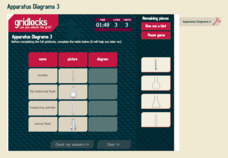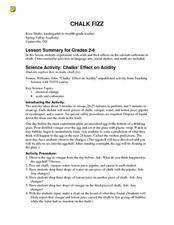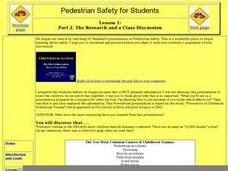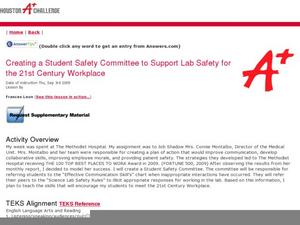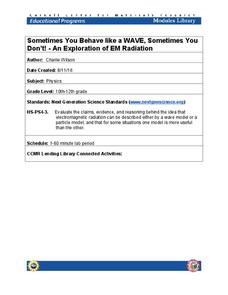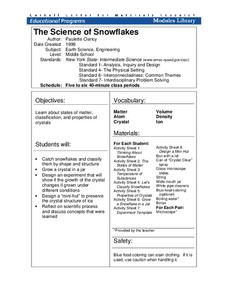Curated OER
Bacteria Lab I: Preparing Agar Plates and Culturing Bacteria
Bacteriologists prepare their own agar plates and culture bacteria on them. The procedures for both tasks are delineated, and questions are posed, but no materials list is printed. Also, the exact amounts of water and nutrient agar are...
Curated OER
Introduction to Materials Science
Students locate, identify and describe the purpose and proper use of all safety equipment in the classroom. They describe the processes involved in following the scientific method, and classify matter according to natural or synthetic...
Royal Society of Chemistry
Hazard Symbols
Starting in 2015, all chemicals must have a pictogram of the associated chemical hazards. A brain-building activity reviews four of the basic symbols found in a typical science laboratory. Through a fun puzzle, scholars apply their...
Royal Society of Chemistry
Apparatus Diagrams 3
Glassware everywhere! How do you help scholars learn to identify the different types of laboratory glassware? Introduce them to some of the main tools of the trade through interactive puzzles. Users match and manipulate items based on...
Curated OER
Chalk Fizz
Little chemists observe the effects of acid on calcium carbonate as an example of chemical change. As a demonstration you will place a raw egg in vinegar overnight, and as a lab activity, learners drip vinegar onto a piece of chalk....
Curated OER
Water Alchemy
After reading "Aquatic Alchemy," an article about recapturing water for reuse when in space, your class will use calcium hydroxide or hydrated lime to purify cloudy water. Geared toward high school chemistry or environmental science...
Curated OER
Lab Safety
In this safety worksheet, students describe the safety concerns identified by the symbols given. Students list precautions to take for these concerns. This worksheet has 6 symbols to describe.
Curated OER
Manufacture of Cheese
Students examine the steps and safety procedures in the cheese making process. They make and taste a variety of cheeses comparing their properties.
Curated OER
Educate Yourself About Food Borne Illness
High schoolers explore the rules to food safety and how to keep foods from growing bacteria. In this food illness lesson plan students view a demonstration about bacteria complete a food safety test online.
Curated OER
Electric Shock
In this electrical worksheet, students answer a series of 17 questions about electrical shock and electrical safety. This worksheet is printable and the answers are available on-line.
Curated OER
Pedestrian Safety for Students; Research and Class Discussion
Young scholars discover the causes of pedestrian trauma concerning students. In this child safety lesson, young scholars investigate the facts behind childhood trauma and discover why children are so often harmed in pedestrian trauma....
Curated OER
Lab Management - Level II
Students who know what lab procedures are expected will work more effectively and be more successful during their lab experiences. See Preface Materials: Students decide upon lab partners and sign their names for each unit. Hand each...
Curated OER
Nutrient Analysis Lab
In this nutrient analysis lab instructional activity, students perform several experiments in a lab setting. Students test products for carbohydrates (monosaccharides and polysaccharides), proteins, lipids, and starches.
Curated OER
What-Not-To-Do Laboratory
In this science and health worksheet, students analyze a detailed drawing of "What-Not-To-Do Laboratory." Students spot the many safety hazards and color the picture.
Columbus City Schools
ABC: Acid Base Chemistry
Bubble, bubble, boil and trouble! What causes common substances like baking soda and vinegar to react the way they do? Welcome your junior chemists to the wonders of acid-base chemistry using a comprehensive and fun resource. Engage them...
Curated OER
Creating a Student Safety Committee to Support Lab Safety for the 21st Century Workplace
Students create a Student Safety Committee. In this lesson for science lab activities, students discuss the communication skills required to help each other in the science lab. Students analyze their classmates' response to a scenario...
Royal Society of Chemistry
Organic Molecules Day—Chemistry Outreach
In search of an organic lab that employs real-life techniques and analysis methods? Groups carry out the nitration of methyl benzoate, then attempt to determine the number and location of the nitro groups added to the benzene ring....
Curated OER
Osmosis and Dialysis
How do you engage pupils in a discussion about osmosis without leaving them overwhelmed? By providing them with the tools to perform an exciting experiment, and they will see osmosis in action! Young chemists and biologists use a potato...
Royal Society of Chemistry
Investigating Temperature Changes on Evaporating Liquids—Microscale Chemistry
Is there more to evaporation than just less liquid? Show young scientists the energy transformation that occurs during a phase change through a series of simple experiments. Lab partners place drops of water, ethanol, and ethoxyethane on...
Cornell University
Sometimes You Behave Like a WAVE, Sometimes You Don't!
Electromagnetic radiation behaves like both a wave and a particle. Help classes explore this concept through a lab investigation. Young scientists create optical interference patterns on a glass slide using a carbon layer. They analyze...
University of Georgia
Heating and Cooling of Land Forms
Compare heating and cooling rates of different land forms. A lab activity has groups collect data on the rate of heating and cooling of soil, grass, saltwater, fresh water, and sand. An analysis of the rates shows how the different land...
Cornell University
Atomic Bonding
Explore the connection of surface area to bonding within atoms. Learners complete lab investigations to model changing surface area with different sizes and concentrations of atoms. A flour fireball demonstration follows the labs to...
National Science Teachers Association
Paper Car Crash Design
High school physical scientists collide with motion. They work in pairs to design a paper car that will protect a raw egg during a head-on collision. Measurements of distance traveled, time of run, vehicle specs, and photo gate flags are...
Cornell University
The Science of Snowflakes
Who can grow the best crystals? Challenge class members to develop strategies for enhancing growth in the crystals. Through a lab investigation, learners study the properties of crystals and test the effectiveness of different growth...
Other popular searches
- Science Lab Safety Rules
- Science Lab Safety
- Biology Lab Safety
- Lab Safety Worksheets
- Lab Safety Rules
- Physical Science Lab Safety
- Biology Lab Safety Lesson
- Chemistry Lab Safety
- Teaching Science Lab Safety
- Lab Safety Lesson Plan
- Msds Lab Safety
- Lab Safety Lesson





